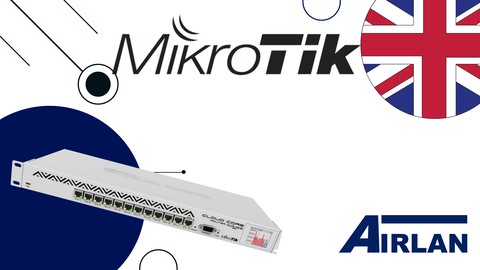
Mikrotik from scratch for everyone
Mikrotik from scratch for everyone, available at Free, has an average rating of 4.5, with 67 lectures, 9 quizzes, based on 147 reviews, and has 1949 subscribers.
You will learn about Have a better understanding of who MikroTik is, and what they do Know how to upgrade your MikroTik’s RouterOS Know how to backup your MikroTik and what type of backups can be made Understand how to use Quick Set to make your router working Understand the PPTP protocol Understand what is the function of connection tracking and its affect to the Firewall Connect MikroTik Wireless station to the AP Understand how to share internet to the LAN PCs using the NAT This course is ideal for individuals who are This course is for students who would like to learn more about Routing and how to apply it on Mikrotik routers or This course is for professional to help them designing Routing in their jobs using Mikrotik routers or Engineers who want to learn how to use MikroTik products in their networks or Students who want to learn and be ready for the MikroTik MTCNA exam It is particularly useful for This course is for students who would like to learn more about Routing and how to apply it on Mikrotik routers or This course is for professional to help them designing Routing in their jobs using Mikrotik routers or Engineers who want to learn how to use MikroTik products in their networks or Students who want to learn and be ready for the MikroTik MTCNA exam.
Enroll now: Mikrotik from scratch for everyone
Summary
Title: Mikrotik from scratch for everyone
Price: Free
Average Rating: 4.5
Number of Lectures: 67
Number of Quizzes: 9
Number of Published Lectures: 67
Number of Published Quizzes: 9
Number of Curriculum Items: 76
Number of Published Curriculum Objects: 76
Original Price: Free
Quality Status: approved
Status: Live
What You Will Learn
- Have a better understanding of who MikroTik is, and what they do
- Know how to upgrade your MikroTik’s RouterOS
- Know how to backup your MikroTik and what type of backups can be made
- Understand how to use Quick Set to make your router working
- Understand the PPTP protocol
- Understand what is the function of connection tracking and its affect to the Firewall
- Connect MikroTik Wireless station to the AP
- Understand how to share internet to the LAN PCs using the NAT
Who Should Attend
- This course is for students who would like to learn more about Routing and how to apply it on Mikrotik routers
- This course is for professional to help them designing Routing in their jobs using Mikrotik routers
- Engineers who want to learn how to use MikroTik products in their networks
- Students who want to learn and be ready for the MikroTik MTCNA exam
Target Audiences
- This course is for students who would like to learn more about Routing and how to apply it on Mikrotik routers
- This course is for professional to help them designing Routing in their jobs using Mikrotik routers
- Engineers who want to learn how to use MikroTik products in their networks
- Students who want to learn and be ready for the MikroTik MTCNA exam
About the course
Practical Mikrotik course, which will allow you to start working with Mikrotik routers and network switches clearly and easily. The scope of the course covers all the topics you need to know to pass the MTCNA exam. When creating this course, we focused on practical knowledge that may be used in real life, and that you may encounter in your future work as an administrator of network devices.
The course is intended for beginners or those who want to supplement their existing knowledge
Course material?
After completing the training, the participant will be familiar with the RouterOS system software and Mikrotik RouterBOARD products. The participant will be able to configure, manage and solve basic problems related to MikroTik routers; will be able to provide basic network services and connect the client to the Internet using multiple network methods (NAT, PPP, IPSec)
In which way?
We tried to limit the theoretical foundations to the necessary minimum so that it was only an introduction to practical workshops. Each part of the material is a practical exercise using actual equipment. The exercises reflect real-world scenarios that the participant may encounter in their work.
Are there any course requirements or prerequisites?
The participant should know and understand the principles of operation of TCP / IP networks; the participant should be able to calculate on IP subnets (CIDR) independently; it will be useful to know English at a level that allows you to understand the technical documentation; own laptop; No prior knowledge of RouterOS is required.
What you will learn:
-
Introduction to the RouterOS system
-
DHCP
-
DHCP server and client
-
ARP protocol
-
-
Briding
-
Introduction to the L2 network
-
Bridge in wireless networks
-
-
Routing
-
Introduction to routing
-
Static Routing
-
-
Wireless networks
-
Introduction to 802.11a / b / g / n / ac network
-
Wireless link configuration
-
Security and encryption in wireless networks
-
Monitoring and troubleshooting
-
-
MikroTik Firewall
-
Basics of Firewall
-
Firewall filter
-
Mailing lists
-
Source NAT
-
Destination NAT
-
MikroTik FastTrack
-
-
MikroTik QoS
-
Simple Queue
-
PCQ – Per Connection Queuing
-
-
Tunnels
-
PPP configuration
-
Address pools – IP pool
-
Local network security – PPPoE
-
Point-to-Point Addressing
-
VPN – PPTP and SSTP
-
-
MikroTik RouterOS advanced tools
-
RouterOS tools (E-mail, Netwatch, Ping, etc.)
-
Monitoring – (Torch, Graphs, SNMP, etc.)
-
Course Curriculum
Chapter 1: Introduction
Lecture 1: About MikroTik
Lecture 2: Winbox download
Lecture 3: First connection to MikroTik
Lecture 4: Reset Configuration
Lecture 5: Reset Configuration Types
Lecture 6: Change Identity MikroTik
Lecture 7: IP Address Adding
Lecture 8: IP Address Adding (Terminal)
Lecture 9: MikroTik update
Lecture 10: Backup
Lecture 11: Import
Lecture 12: Services
Lecture 13: MikroTik Version
Lecture 14: MikroTik Licence
Lecture 15: IP Neighbor (terminal)
Lecture 16: Safe mode
Chapter 2: DHCP
Lecture 1: DHCP what is it?
Lecture 2: IP pool
Lecture 3: DHCP Server
Lecture 4: DHCP Client
Lecture 5: DHCP Server Terminal
Lecture 6: DHCP Client Terminal
Lecture 7: DHCP Menagment
Lecture 8: ARP what is it?
Chapter 3: Bridge
Lecture 1: Bridge what is it?
Lecture 2: Bridge setup (temrinal)
Lecture 3: Bonding
Lecture 4: VLAN
Chapter 4: Routing
Lecture 1: Routing what is it?
Lecture 2: Routing Static
Lecture 3: RIP
Lecture 4: OSPF
Chapter 5: Wireless
Lecture 1: Wireless what is it?
Lecture 2: Wireless simple configuration
Lecture 3: Access point
Lecture 4: Wireless bridge
Lecture 5: WDS
Lecture 6: Access list
Lecture 7: Connect list
Lecture 8: Wireless protocols
Lecture 9: Snooper
Chapter 6: Firewall
Lecture 1: Firewall what is it?
Lecture 2: NAT
Lecture 3: Rules
Lecture 4: Rules Adding
Lecture 5: RAW
Lecture 6: Packet Control
Lecture 7: Protect without DDoS attack
Lecture 8: Protect without Flood attack
Chapter 7: QoS
Lecture 1: QoS what is it?
Lecture 2: Types of QoS
Lecture 3: Create QoS
Lecture 4: Traffic management in QoS
Chapter 8: Tunels
Lecture 1: Tunels what is it?
Lecture 2: PPP
Lecture 3: PPPoE
Lecture 4: VPN
Lecture 5: SSTP
Lecture 6: L2TP
Chapter 9: Extra Tools
Lecture 1: Graphs
Lecture 2: IP scan
Lecture 3: Ping
Lecture 4: Telnet
Lecture 5: Torch
Lecture 6: Traceroute
Lecture 7: Sniffer
Lecture 8: Package List
Instructors
-
Airlan Technologie Sieciowe
Od 20 lat szkolimy najlepszych
Rating Distribution
- 1 stars: 1 votes
- 2 stars: 5 votes
- 3 stars: 20 votes
- 4 stars: 47 votes
- 5 stars: 74 votes
Frequently Asked Questions
How long do I have access to the course materials?
You can view and review the lecture materials indefinitely, like an on-demand channel.
Can I take my courses with me wherever I go?
Definitely! If you have an internet connection, courses on Udemy are available on any device at any time. If you don’t have an internet connection, some instructors also let their students download course lectures. That’s up to the instructor though, so make sure you get on their good side!
You may also like
- Best Investing Courses to Learn in March 2025
- Best Personal Finance Courses to Learn in March 2025
- Best Health And Wellness Courses to Learn in March 2025
- Best Chatgpt And Ai Tools Courses to Learn in March 2025
- Best Virtual Reality Courses to Learn in March 2025
- Best Augmented Reality Courses to Learn in March 2025
- Best Blockchain Development Courses to Learn in March 2025
- Best Unity Game Development Courses to Learn in March 2025
- Best Artificial Intelligence Courses to Learn in March 2025
- Best Flutter Development Courses to Learn in March 2025
- Best Docker Kubernetes Courses to Learn in March 2025
- Best Business Analytics Courses to Learn in March 2025
- Best Excel Vba Courses to Learn in March 2025
- Best Devops Courses to Learn in March 2025
- Best Angular Courses to Learn in March 2025
- Best Node Js Development Courses to Learn in March 2025
- Best React Js Courses to Learn in March 2025
- Best Cyber Security Courses to Learn in March 2025
- Best Machine Learning Courses to Learn in March 2025
- Best Ethical Hacking Courses to Learn in March 2025






















